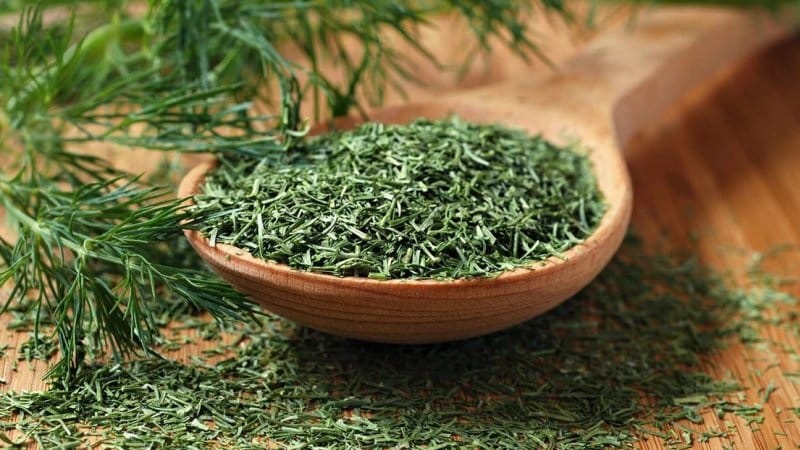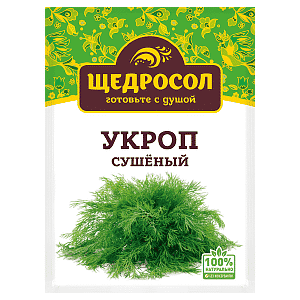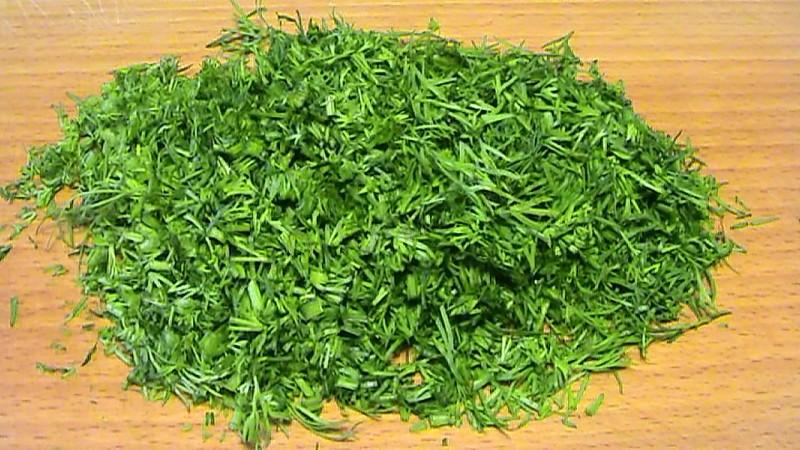What are the benefits of dried dill, how to prepare and use it
Dill is a unique plant material that has a strong spicy, refreshing taste and smell, a rich composition and has a beneficial effect on many body systems. It is widely used both in cooking and in folk medicine.
In order to always have a much-needed product on hand, the fruits and herbs of the plant are dried, canned, and frozen. If the harvesting technology is followed, dry dill is not inferior in usefulness to fresh dill, but it can be used throughout the year, and not just during the ripening period in nature.
Let's consider the benefits and harms of dried dill, how to prepare and store it, and the features of its use in cooking and folk medicine.
What is good about dried dill?
Dry dill retains almost all minerals, micro- and macroelements beneficial to the body. It contains flavonoids that prevent the formation of carcinogenic substances in the body, suppress the growth of cancer cells, prevent cholesterol from sticking to the inner walls of blood vessels, improve cognitive functions, and activate the enzyme system.

Nutritionists recommend adding dill to food for those who want to lose weight or are watching their weight.The plant fiber contained in the composition cleanses the body of toxins and toxins, stimulates metabolism, accelerates the process of fat breakdown, provides a quick and long-lasting feeling of satiety, which reduces the volume of portions and eliminates the need for additional snacks.
Dried dill partially satisfies the body's needs for vitamin A, ascorbic acid, potassium, calcium, magnesium, manganese, copper, zinc, phosphorus, iron, and other vitamins and minerals important for the body.
For reference. The taste and smell of dry dill do not change. But provided that the harvest is properly collected, prepared and stored, the shelf life is 24 months, while fresh greens can be stored in the refrigerator for no more than 7 days.
Composition, properties, KBJU
Dill leaves contain a lot of vitamin A and PP, ascorbic and nicotinic acids, riboflavin (vitamin B2), thiamine (vitamin B1), pyridoxine (vitamin B6). Of the macroelements, calcium, potassium, magnesium, sodium, phosphorus were found in the composition; microelements - iron, manganese, copper, zinc. The leaves contain flavonoids, pectin fibers, essential oils, and ash.
Energy value of dill: 253 kcal per 100 g. The greens contain virtually no fat (4.4 g), but are saturated with carbohydrates (42.2 g) and proteins (20 g).
Benefit
When consumed frequently, dill is beneficial for the body as a whole and each organ and organ system separately:
- Digestive system. Improves the functioning of the gastrointestinal tract, normalizes appetite, stimulates intestinal motility, reduces the accumulation of gases, relieves or completely relieves painful spasms in the stomach.

- The cardiovascular system. Ensures normal myocardial function, stabilizes blood pressure, lowers cholesterol levels, prevents platelet aggregation, which serves as a good prevention of myocardial infarction, stroke, and atherosclerosis. Expands the lumen of blood vessels, which normalizes blood circulation and ensures free flow of blood along with oxygen and nutrients to organs and tissues.
- Respiratory system. Dill infusion is recommended for infectious and colds of the upper respiratory tract, bronchitis without sputum. The plant provokes irritation of the bronchial mucosa, as a result, the secretion of sputum increases, making it easier for it to come out.
- Nervous system. It has a calming effect on the central nervous system, reduces emotional tension and the effects of stress, slows the heart rate, reduces excitability, and normalizes night sleep.
- Urinary system. It has a direct effect on the kidneys: by blocking the reabsorption of water and sodium chloride, it increases urine excretion. Due to this, the volume of circulating blood decreases, swelling subsides, and in patients with heart failure, the load on the heart muscle is reduced. This effect is important for diseases accompanied by water and salt retention in the body.
- The immune system. Strengthens immune defense, prevents the strengthening and proliferation of pathogenic microorganisms on the mucous membranes of the respiratory tract, prevents chronic respiratory diseases, and serves as a prevention of influenza, acute respiratory viral infections, and acute respiratory infections.
It should be noted that the vitamins and mineral salts contained in dry dill are beneficial for the body.
Vitamin A slows down the aging process, takes part in the formation of new cells, improves the condition of skin, hair and nails, neutralizes dangerous free radicals, accelerates healing of wounds and burns.
Calcium is important for healthy teeth and bones, slows down the processes of bone tissue destruction. Magnesium and potassium are responsible for maintaining water and electrolyte balance, participate in the transmission of excitation from nerve cells to muscles, and regulate the metabolism of proteins and carbohydrates.
Zinc stimulates the production of testosterone, the main male sex hormone. In men, it accelerates protein synthesis, increases muscle mass, participates in the development of male genital organs and secondary characteristics, and ensures sexual health and sexual behavior. The benefits of zinc for the female body include the prevention of infertility, the formation of the endometrium and ensuring the normal course and completion of pregnancy.
Dill partially satisfies the body's need for manganese. A deficiency of the biological component leads to impaired carbohydrate metabolism, delayed hair and nail growth, decreased bone density, and loss of reproductive function.
Reference. The infusion is recommended for nursing women to enhance lactation and restore the disrupted menstrual cycle.
Harm and contraindications
The harm of dry dill to the body is associated with its use in case of individual hypersensitivity to the components of the plant or the presence of contraindications.
In people with arterial hypotension, dill can significantly lower blood pressure. This condition is accompanied by dizziness, blurred vision, unsteadiness of gait, and fainting.Long-term persistence of the symptom of arterial hypotension threatens menstrual irregularities in women and decreased potency in men.
Dill should be consumed carefully and in moderation during pregnancy, especially in the third trimester. Dry herbs and stems stimulate uterine contractions, which in combination with other unfavorable factors (stress, vitamin deficiency, genital infections) increases the risk of premature birth.
How to prepare dried dill
Herbs and dill stems are used as medicinal raw materials. Between June and September, stems with seeds and the leaves are cut off, bunches are formed, which are placed upside down in a paper bag and left in a dry, warm, well-ventilated place for 7–10 days.
Advice. It is better to cut greens in the morning before dew falls or late in the evening when the sun is near the horizon. It is advisable to choose a time when there is low air humidity.
Drying methods
There are several ways to dry dill for the winter at home. One of them is suspended in whole bunches. Other options:
- In an electric oven. Rinse the dill well, separate the greens from the stems, and remove any remaining moisture with a paper towel. Cover a baking sheet with parchment, arrange the dill sprigs, and place in the oven with the door ajar for 2 hours at 40 degrees. Every half hour or hour, remove the baking sheet and stir the greens.
- In a special dryer. Place clean dill in the drying container. Dry at 50 degrees.
- Outdoors. Wash the dill stems along with the herbs, cut them, and blot with a paper towel to remove any remaining water.Cover the bottom of a clean and dry vessel with cloth or gauze folded in several layers, pour out and evenly distribute chopped dill over the surface. Cover the top of the greens with gauze to prevent dust from settling and damage by insects. Leave in a warm and well-ventilated area for 5–7 days.
There is another known way to dry dill. For this you will need a microwave oven. Cover the bottom of a dry glass plate with a paper towel, place clean dill on top, cover with a paper towel. Set to maximum power for 2 minutes.
How to store it
Dry dill is stored in a clean glass container under a lid for 2 years. It is important to avoid direct exposure to sunlight. Place the jars in a dry, dark place or refrigerator.
Use in cooking
Dried dill has a spicy, refreshing smell and taste. It is used as an independent seasoning or in spice mixtures to add flavor to hot and cold dishes: meat, potatoes, mushrooms, vegetables, casseroles, soups. Dill is used as an ingredient for sauce. It goes well with mayonnaise, sour cream, olive oil, garlic, and parsley.

Greens along with umbrellas are used for preserving vegetables. The plant not only imparts a specific taste, but also, due to the presence of phytoncides in the composition, protects against spoilage and mold formation. It is also added to marinade, for sauerkraut, and to brew tea.
Advice. Since dry dill has a rich smell and taste, it should be added to food carefully in small quantities so as not to overwhelm or spoil the taste of the main dish.
Dill in folk medicine
For the treatment and prevention of somatic diseases, a decoction and infusion of dry herbs and dill stems is used.For decoction 1 tbsp. l. chopped greens, pour 1 liter of water, bring the mixture to a boil in a water bath, cook for 15 minutes. After the broth has cooled, strain through several layers of gauze. Take 100–250 ml orally per day.
Infusion recipe: 1 tbsp. l. dry herbs, pour 1 liter of boiling water, leave covered for 60–90 minutes, then strain. This infusion can be given to newborns with increased gas formation, 1 tsp. 3–5 times a day.
Read also:
How to pickle dill in jars for the winter: simple recipes from experienced housewives.
How to quickly germinate dill seeds and how to treat them to speed up the germination of greens.
Conclusion
Experts recommend including dried dill in your daily diet as a preventive measure for a wide range of diseases. It has antibacterial, expectorant, antispasmodic, diuretic, choleretic effects, enhances intestinal motility, normalizes metabolism, promotes weight loss, and reduces the risk of cardiovascular diseases.
In small quantities, dill gives dishes a spicy, refreshing taste and aroma. It is easy to prepare, can be stored for a long time and, most importantly, has virtually no contraindications.